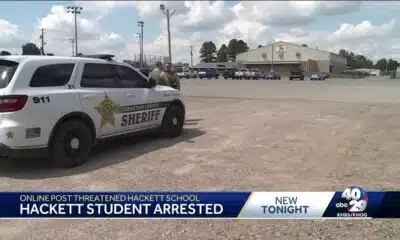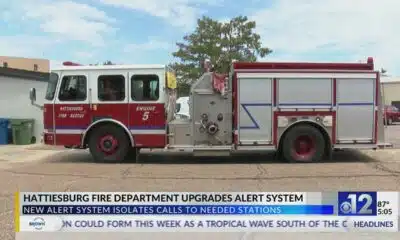Mississippi News
Congress hears about plight of Black Delta farmers
Congress hears about plight of Black Delta farmers featured in Mississippi Today investigation
The struggles of Black farm workers in the Mississippi Delta losing jobs and being paid lower wages than white guest workers were brought in front of a U.S. congressional committee on Wednesday.
Mississippi attorney Ty Pinkins traveled to the nation’s capital to testify in front of the House Education and Labor Committee, which is examining the H-2A and H-2B farm workers visa programs. The H-2A program was the focus of a recent Mississippi Today investigation that found several farmers misusing it to underpay and push out Black workers from their jobs in favor of workers from South Africa.
“Despite all the laws and regulations designed to protect American workers against unfair competition, local farm workers in the Delta have been displaced as area farmers each year import more and more foreign workers,” Pinkins testified.
Pinkins, a retired Army officer and son of a Delta farm worker, has worked closely with Black workers fighting discrimination in Delta. He has helped file two discrimination lawsuits against Mississippi farms with more in the pipeline.
“Absent major changes in the way the H-2A program is administered and its rules enforced, there won’t be another American generation of local Black farm workers in the Delta,” Pinkins told representatives.
Pinkins also referenced Mississippi Today’s extensive reporting during his five-minute testimony.
READ MORE: Exploited: White Delta farm owners are underpaying and pushing out Black workers
Near the hearing’s end, the focus came back to Mississippi after speakers covered the conditions from Georgia to the Carlonias and California.
Rep. Mark Takano, a Democrat from California, seemed stunned at the testimony. He had heard of foreign workers being brought in and paid less money than local workers, he said, but not the opposite.
“You’re telling me that these H-2A employers are paying, specifically white South African workers, more than the local Black workforce? Help me understand because it’s obviously not economic reasons,” he said to Pinkins.
“This doesn’t make sense from a business perspective,” Pinkins said in his response.
“So, the only common denominator here is race.”
Pinkins said following the 90-minute hearing, he was glad he was able to make that point at the end.
In addition to Pinkins, three other experts testified: Daniel Costa, an immigration attorney and researcher with the Economic Policy Institute; Teresa Romero the president of the United Farm Workers; and Leon Sequeira, an attorney who works closely with farm owners and served as an assistant secretary of labor under George W. Bush.
Wednesday’s hearing had a back-and-forth partisan rhythm, with a clear divide in perspectives on the programs’ issues and the issues facing the farming workforce at large. Republican representatives repeatedly emphasized their concerns over the number of undocumented workers entering the country.
“President Biden’s border crisis hangs over this hearing,” said Rep. Fred Keller, a Republican from Pennsylvania. “It’s a self-made disaster that is endangering millions and creating a humanitarian crisis. We cannot meaningfully discuss reforming the H-2 programs while our border is wide open and being overrun.”
The H-2A program is designed to fill gaps in the workforce when farmers cannot find enough U.S. workers to fill seasonal jobs.
Democrats on Wednesday were concerned about the findings in “Operation Blooming Onion,” which a Georgia U.S. district attorney called “modern-day slavery.” Investigators say a smuggling ring misused the H-2A program to traffic and abuse more than 200 workers from Mexico, Honduras and Guatemala to work on onion farms.
The problems facing local Delta workers may be different, but are stemming from the same visa program. Mississippi Today’s investigation farms often made no effort to bring back Black workers who had worked previous seasons, preferring the white H-2A workers from South Africa.
In the instances in the Delta, it was the local workers — who are typically Black — being affected negatively through misuse of the program.
More than 90% of H-2A workers come from Mexico. South Africans make up about 3% of the program, according to data from the U.S. Department of Labor.
“These programs do not reflect their intended purpose,” said Rep. Alma Adams, a Democrat from North Carolina, who chairs the Subcommittee on Workforce Protections. “Instead, these programs are a relic of slavery. Together we must reform the H-2 visa programs to ensure that all workers are treated with dignity and respect.”
Sequeira, who handled policy on Bush’s team, spoke to the majority of farms following the program’s rules. He said many of his clients have gotten wrapped up in audits for minor offenses that over burden them.
Pinkins told Mississippi Today following the hearing that he felt Republican representatives weren’t taking the happenings in the Delta seriously.
Pinkins pointed to Sequeira’s written testimony, which stated that H-2A employees do not harm U.S. workers.
“They are basically just blind with regards to detrimental effects the H-2A program is having on Black farm workers in the Delta,” Pinkins told Mississippi Today. “They were basically saying, ‘Because a small percentage are misusing the H-2A program, it’s OK. A place like the Mississippi Delta? We don’t care about that small group of farmers.’”
He said much of the hearing felt like it was diverting away from the central issues. Still, he’s eager to see what the committee determines.
Rep. Adams ended the hearing by saying she looked forward to working with committee members on future legislation to address worker discrimination and strengthening labor standards.
READ MORE: Here’s how we reported the story of Black farmers losing out on jobs
This article first appeared on Mississippi Today and is republished here under a Creative Commons license.
Mississippi News
Can you remain anonymous in Mississippi if you win the $1.8B Powerball jackpot?
SUMMARY: The Powerball jackpot has reached an estimated $1.8 billion, the second-largest in U.S. history. Winners must decide between a lump sum or annuity payout and should keep their ticket safe, sign it, and assemble a team of financial, tax, and legal advisors. Experts recommend maintaining privacy, though disclosure laws vary by state. Some states require public release of winners’ names and locations, while others allow anonymity or temporary confidentiality based on prize amounts. Many winners use trusts for privacy. Powerball is played in 45 states plus D.C., Puerto Rico, and U.S. Virgin Islands, with odds of 1 in 292.2 million.
The post Can you remain anonymous in Mississippi if you win the $1.8B Powerball jackpot? appeared first on www.wjtv.com
Mississippi News
Events happening this weekend in Mississippi: September 5-7
SUMMARY: This weekend (September 5-7) in Mississippi offers diverse events across the state. In Central Mississippi, highlights include the “Wild Robot” screening in Jackson, the Roosevelt State Park reopening in Morton, the Hurricane Katrina photo exhibit, and art shows at the Mississippi Children’s Museum and Mississippi Museum of Art. Activities also include roller derby, farmers markets, painting classes, and a Woodstock-themed festival. In the Pine Belt region, Hattiesburg hosts charity events, art classes, live music concerts, a food truck festival, and Southern Miss football games, alongside karaoke nights and museum exhibits. These events suit all ages and interests, ideal for relaxation and exploration.
The post Events happening this weekend in Mississippi: September 5-7 appeared first on www.wjtv.com
Mississippi News
Mississippi universities halt funding for student groups, citing DEI law
SUMMARY: Some Mississippi universities have halted funding for student organizations due to a state law (House Bill 1193) banning diversity, equity, and inclusion (DEI) programs, currently blocked by a federal judge for potentially violating First Amendment rights. The law exempts registered organizations but prohibits using student activity fees—considered state funds—for DEI-related programming. Consequently, universities like the University of Mississippi and Mississippi State redirected these fees to campus departments for organizing activities, suspending the student-driven funding process. Students and leaders express concern, fearing loss of support for events and club activities, with efforts underway to find alternative funding amid growing legal uncertainty.
The post Mississippi universities halt funding for student groups, citing DEI law appeared first on www.wjtv.com
-
Mississippi Today7 days ago
Trump proposed getting rid of FEMA, but his review council seems focused on reforming the agency
-
Mississippi Today6 days ago
Brandon residents want answers, guarantees about data center
-
News from the South - Texas News Feed5 days ago
Texas high school football scores for Thursday, Sept. 4
-
Our Mississippi Home6 days ago
Southern Miss Faculty and Student Contribute to Groundbreaking NOAA-Funded Plastic Cleanup
-
News from the South - Arkansas News Feed7 days ago
Hackett student arrested after shooting threat
-
The Conversation6 days ago
AI is transforming weather forecasting − and that could be a game changer for farmers around the world
-
News from the South - Oklahoma News Feed7 days ago
Family sues Roblox, accusing them of failing to protect kids from predators
-
Mississippi News Video7 days ago
Hattiesburg Fire Department to implement new alert system




































